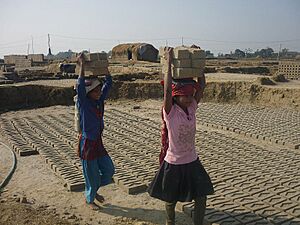Debt bondage facts for kids

Bonded labour is a very unfair work situation. It is also known as debt bondage or debt slavery. It happens when someone has to work for a person who lent them money. This work is often very hard and the pay is extremely low.
The conditions of bonded labour are very similar to slavery. It is one of the most common forms of modern-day slavery. People in bonded labour often work for many years. They may never be able to pay off their debt. This is because the amount they owe is often not clear. Also, they are paid so little that the debt keeps growing.
In a normal job, workers have rights. They agree on how much work they will do and how much they will be paid. Dangerous or very hard work usually pays more. But in bonded labour, workers have no rights. They are often forced to do difficult and dangerous tasks without fair pay.
Contents
What is Bonded Labour?
Bonded labour means someone is forced to work to pay back a loan. This loan might be very small. It could be money for food, medicine, or a family emergency. The person who lent the money controls the worker. They decide how much work is done and how little is paid.
This system is very unfair. The worker's pay is so low that they can never clear the debt. The debt might even be passed down to their children. This means entire families can be trapped for generations. They are forced to work without freedom.
Why is it like Slavery?
Bonded labour is often called "debt slavery" because it takes away a person's freedom. Workers cannot leave their job. They cannot look for better work. They are tied to the person they owe money to. This is very similar to how people were treated in historical slavery.
Workers in bonded labour have no control over their lives. They might be forced to work long hours. They may not get enough food or rest. They often live in very poor conditions. Their basic human rights are taken away.
Is Bonded Labour Legal?
No, bonded labour is against the law in most countries. The United Nations banned debt bondage in 1956. This was part of a special agreement about slavery. Many countries have laws against it. However, it still happens in many parts of the world. This is often because laws are not always enforced. People who are trapped might not know their rights. They may also be afraid to speak out.
Related pages
Images for kids
 | Chris Smalls |
 | Fred Hampton |
 | Ralph Abernathy |



